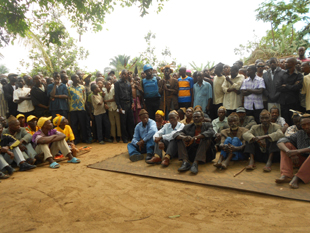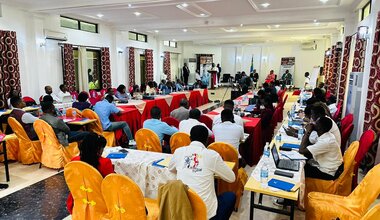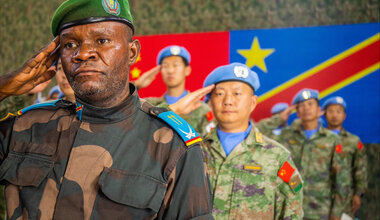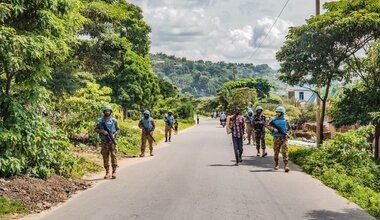MONUSCO participates to inter-communal reconciliation at Mweka, Western Kasaï

Kananga, 3 September 2013 – A team of the Civil Affairs section of the United Nations Stabilization Mission in the Democratic Republic of Congo (MONUSCO) visited the territory of Mweka, Western Kasai, from 16 to 21 August 2013 on a mission aimed to advance the reconciliation and peace process between three local communities in a decades-long conflict. The process was launched last year.
The population in the villages Bungamba, Bakatombi and Bulangu-Kapimbi, in the territory of Mweka, 240km away from the provincial capital Kananga signed in September 2012 a reconciliation and peace agreement to halt the conflict over the exploitation of the agro-forest district of Mwangala. This conflict started in 1974
The signing of this agreement is the result of nearly two years of mediation and sensitization efforts made by MONUSCO for the three communities, following the violent clashes between them in 2010 which killed several people and caused serious damages. Sensitization efforts were made in collaboration with local mediators trained by the UN mission, with technical support from the NGO Search for Common Ground.
The mission sets itself three objectives: 1. to encourage effective implementation of the commitments made by the three parties to restore social peace in this territory; 2. to further sensitize the three communities on the said agreement and; 3. to study the feasibility of the project on the parceling out of the disputed forest in accordance with the proposed demarcations during the signing of the agreement.
The parceling-out scenario was envisaged after noting that the investigations conducted on the ground suggested that none of the three villages had a land possession title to claim the forest.
In the meantime, pursuant to the agreement, the three communities were requested to comply with the provisional arrangement which recognizes the current demarcation, pending the final demarcation of the disputed lands.
The consultations conducted with the three communities led to the following recommendations: that parties must comply with the provisions of the signed agreement, especially in regard to the exploitation of the portion of land recognized for each; that the trained community mediators must have no bias in accompanying the communities' efforts for the already achieved peace consolidation; that the communities must propose realistic integrator projects to the Committee tasked to analyze the risks to approve, guide and support the project.
At the end of MONUSCO Civil Affairs' mission, representatives of the three communities declared they regard the initiative as a further step towards the restoration of a lasting peace in that part of the Eastern Kasai province.
Lansana Dabo/ MONUSCO
 ONU
ONU Nations Unies Maintien de la paix
Nations Unies Maintien de la paix



